:max_bytes(150000):strip_icc():format(webp)/best-time-of-day-to-instagram-3485858-1-5bb3cc9046e0fb002612537d.jpg)
New 2024 Approved Transforming Your Speech Into Powerful Bass with Filmora Filmmaking

Transforming Your Speech Into Powerful Bass with Filmora Filmmaking
You have watched trailers for movies, TV shows, and YouTube videos throughout the year. Your ears have heard radio advertisements and podcasts. It has dawned on you that deep voices sound much better than shallow voices. However, how to make your voice deeper?
Nature would list voice deepening at the top of her list of requests if she had one. People who use their voices as a source of income, voice actors, and even the everyday person think about reducing the pitch of the sound they make.
Speaking with a deeper voice can help you sound more authoritative or become a better speaker. We have conducted extensive research on this topic, and controlling your breathing is one way to make your voice deeper, but it requires a lot of practice. Likewise, you can project your voice and try various techniques to use when you speak deeply, such as swallowing before you start to speak.
If you want to learn how you can make your voice deeper, then you just landed on the right page. In this article, we will suggest to you some natural tips to make your voice deeper, but it is a very time-consuming process because it needs a lot of practice. There is another method to make your voice sound deeper if you are recording it for videos or any other purpose. There are many software and apps available in the market today that can help you alter your voice and make it sound deeper. This article will show you how you can make your voice deeper using Filmora X.
So, Let’s start our article with a basic question.
Can You Make Your Voice Deeper?
Yes, It is possible to make your voice deeper.
It is possible to train your voice for a deep, more attractive sound even though you cannot lower it. According to numerous sources online, you can achieve a lower voice pitch by doing specific exercises. However, experts and physicians have not tested these deep voice exercises, which can lead to long-term harm to your throat.
The best way is to use software like Filmora X because all you need to do is record your voice and leave the rest to the software. Using Filmora X, you can easily edit your voice and adjust the pitch to make it sound deeper.

How To Make Your Voice Deeper Naturally?
1. Listen to Yourself
First of all, you have to think about what you have to work with. Record yourself talking with the app on your phone that records audio. If you do not listen carefully to your voice, you will not know what needs to be fixed.
Take a moment to listen to your voice. Because you’re now hearing your voice from an external perspective, it might sound completely different from how you thought it would. You can’t always avoid mistakes, but you can learn from them.
Take note of how you sound and accept that this is exactly how you sound. During this exercise, listen carefully as words come out of your mouth, study your pitch, and record your voice so you can review the recording later after you’ve completed your exercise.
2. Relax Your Muscles
As a consequence of stress, bad posture, and injuries, our muscles are drowning in tension. Our entire lives involve the use of our bodies, which directly affects our muscles and adds a great deal of tension. There are four key areas of our body. If you want to make your voice deeper, then you have to release tension from these four key areas. They include the tongue, jaw, throat, and neck. All these organs play a key role in controlling your voice. So, if you are able to relieve stress from these organs and you are able to relax them, then you can easily make your voice deeper with a little practice.
3. Use Your Diaphram
If you’re wondering how to make your voice deeper, you shouldn’t use your chest for breathing when we have a whole respiratory system to control. As a rule of thumb, the deeper your voice sounds, the deeper the air you inhale goes. You can direct the air to go just where you want it by adjusting the diaphragm.
As you breathe in, bring your nose to your mouth and push your chest backward while taking deep breaths from your nose. When you exhale, tell yourself your full name as you do so. When you speak, you may feel a vibration. It is now easier for you to produce a deeper voice effect since you have learned how to use your diaphragm.
In the world of professional singing, diaphragmatic breathing is one of the most popular techniques. With it, they can control their voice and position it precisely when they want, to produce deep, low-pitched cries (or even high-pitched cries). When you first start, you won’t be able to do it naturally, but you’ll be able to do it subconsciously with practice.
4. Practice Your Chest Voice
The magic happens in your chest voice. You can make it sound stronger, deeper, and less nasal with a little control. These exercises will focus on deepening your voice since you’re looking for ways to make your voice deeper.
Engage your throat first and then speak normally. You will sound lighter and less confident if you usually speak through your nose, which is not good for a deep voice.
Make a hissing sound while exhaling a deep diaphragmatic breath. Having your voice-controlled right within your lungs will allow you to open up your chest. It would help if you started talking now. You will feel your voice flowing up and out of your mouth via your breath. This is the voice of your chest.
5. Hum Like You Mean It
Humming warms up your voice, making it easier to control. In addition, it unleashes feelings of relaxation throughout your entire body, so your muscles can be relaxed. With Hum, you’ll be able to lower your voice pitch, talk deeper, and even make your voice sound deeper in a video. Hold your breath with a deep humming for as long as possible. During this process, your vocal cords will be stretched, and stretched vocal cords always give a voice a deeper tone.
As you breathe in again, point your chin downwards toward your chest. Put your chin up and start humming. Speak now. You will feel intense and deep in your voice.
These are some of the natural ways to make your voice deeper. But the thing is, all of them need a lot of practice, and according to experts, one can also damage his vocal cords when practicing all these techniques. But as we told you earlier, there is an easier way of making your voice deeper which is discussed below.
How To Make Your Voice Deeper With Filmora?
You can use Filmora to make your voice sound deeper in your already recorded videos. You don’t need to do intense exercises to sound deeper. Just record your video in your natural voice and follow the steps given below to edit your voice and make it deeper.
Step1: First of all, make sure that the latest version of Wondershare Filmora video editor is installed on your computer. If it isn’t already installed, then you can download it below or go to the official website.
For Win 7 or later (64-bit)
For macOS 10.12 or later
Step2: Now, Run the Program and import your video to Filmora by clicking on the file, then import, and then click on import media files.
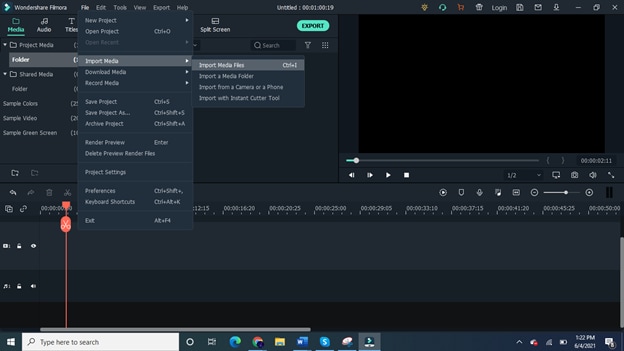
Step3: Now drag the video and drop it into the timeline.
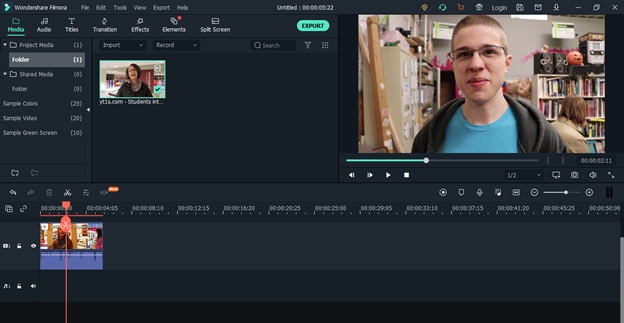
Step4: Now, right-click on the track in the timeline and click on “Adjust Audio” from the menu.
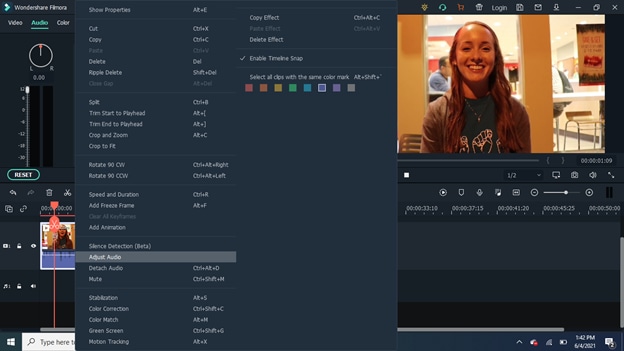
Step 5: Now, you need to adjust the pitch at this step. Try to lower the pitch by a point or two, and you play the video. You will notice a considerable change in your voice. You will feel that your voice has become much deeper than the original one.
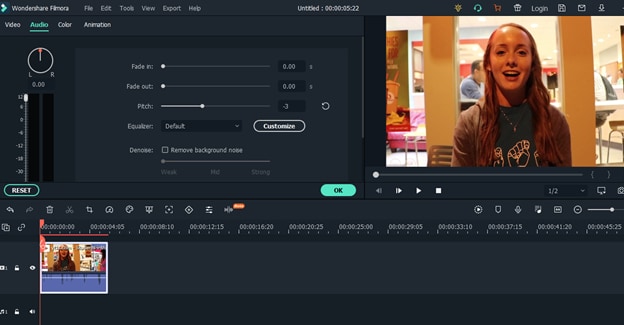
Step 6: Reduce the pitch point by point by point and observe that at which point do you have the desired depth in your voice.
Step7: Once you are satisfied with the results, all you need to do is click on the “OK” button to save the settings and then export your video to your system.
These are some simple steps to make your voice deeper in Filmora easily. It only takes a few seconds if you do the things right.
Conclusion
So, in this article, we discussed some of the natural ways to make your voice deeper, and then we discussed how you can make your voice deeper with Filmora. If you compare both methods, then in our opinion, using FIlmora is the best choice here. Using natural methods requires you to do a lot of practice, and still, there is a possibility that you won’t be able to get the desired results. But, in Filmora, all you need to do is adjust the pitch of your voice, and you are good to go. Here you also have an option to make your voice deeper as much as you.
You might be interested in: Top Siri Voice Generator for Windows .
Versatile Video Editor - Wondershare Filmora
An easy yet powerful editor
Numerous effects to choose from
Detailed tutorials provided by the official channel
For macOS 10.12 or later
Step2: Now, Run the Program and import your video to Filmora by clicking on the file, then import, and then click on import media files.

Step3: Now drag the video and drop it into the timeline.

Step4: Now, right-click on the track in the timeline and click on “Adjust Audio” from the menu.

Step 5: Now, you need to adjust the pitch at this step. Try to lower the pitch by a point or two, and you play the video. You will notice a considerable change in your voice. You will feel that your voice has become much deeper than the original one.

Step 6: Reduce the pitch point by point by point and observe that at which point do you have the desired depth in your voice.
Step7: Once you are satisfied with the results, all you need to do is click on the “OK” button to save the settings and then export your video to your system.
These are some simple steps to make your voice deeper in Filmora easily. It only takes a few seconds if you do the things right.
Conclusion
So, in this article, we discussed some of the natural ways to make your voice deeper, and then we discussed how you can make your voice deeper with Filmora. If you compare both methods, then in our opinion, using FIlmora is the best choice here. Using natural methods requires you to do a lot of practice, and still, there is a possibility that you won’t be able to get the desired results. But, in Filmora, all you need to do is adjust the pitch of your voice, and you are good to go. Here you also have an option to make your voice deeper as much as you.
You might be interested in: Top Siri Voice Generator for Windows .
Versatile Video Editor - Wondershare Filmora
An easy yet powerful editor
Numerous effects to choose from
Detailed tutorials provided by the official channel
For macOS 10.12 or later
Step2: Now, Run the Program and import your video to Filmora by clicking on the file, then import, and then click on import media files.

Step3: Now drag the video and drop it into the timeline.

Step4: Now, right-click on the track in the timeline and click on “Adjust Audio” from the menu.

Step 5: Now, you need to adjust the pitch at this step. Try to lower the pitch by a point or two, and you play the video. You will notice a considerable change in your voice. You will feel that your voice has become much deeper than the original one.

Step 6: Reduce the pitch point by point by point and observe that at which point do you have the desired depth in your voice.
Step7: Once you are satisfied with the results, all you need to do is click on the “OK” button to save the settings and then export your video to your system.
These are some simple steps to make your voice deeper in Filmora easily. It only takes a few seconds if you do the things right.
Conclusion
So, in this article, we discussed some of the natural ways to make your voice deeper, and then we discussed how you can make your voice deeper with Filmora. If you compare both methods, then in our opinion, using FIlmora is the best choice here. Using natural methods requires you to do a lot of practice, and still, there is a possibility that you won’t be able to get the desired results. But, in Filmora, all you need to do is adjust the pitch of your voice, and you are good to go. Here you also have an option to make your voice deeper as much as you.
You might be interested in: Top Siri Voice Generator for Windows .
Versatile Video Editor - Wondershare Filmora
An easy yet powerful editor
Numerous effects to choose from
Detailed tutorials provided by the official channel
For macOS 10.12 or later
Step2: Now, Run the Program and import your video to Filmora by clicking on the file, then import, and then click on import media files.

Step3: Now drag the video and drop it into the timeline.

Step4: Now, right-click on the track in the timeline and click on “Adjust Audio” from the menu.

Step 5: Now, you need to adjust the pitch at this step. Try to lower the pitch by a point or two, and you play the video. You will notice a considerable change in your voice. You will feel that your voice has become much deeper than the original one.

Step 6: Reduce the pitch point by point by point and observe that at which point do you have the desired depth in your voice.
Step7: Once you are satisfied with the results, all you need to do is click on the “OK” button to save the settings and then export your video to your system.
These are some simple steps to make your voice deeper in Filmora easily. It only takes a few seconds if you do the things right.
Conclusion
So, in this article, we discussed some of the natural ways to make your voice deeper, and then we discussed how you can make your voice deeper with Filmora. If you compare both methods, then in our opinion, using FIlmora is the best choice here. Using natural methods requires you to do a lot of practice, and still, there is a possibility that you won’t be able to get the desired results. But, in Filmora, all you need to do is adjust the pitch of your voice, and you are good to go. Here you also have an option to make your voice deeper as much as you.
You might be interested in: Top Siri Voice Generator for Windows .
Versatile Video Editor - Wondershare Filmora
An easy yet powerful editor
Numerous effects to choose from
Detailed tutorials provided by the official channel
How to Seamlessly Convert Your Podcast Into the Universal MP3 Format
Converting podcasts to MP3 is simpler than many of you think. Whether you’re looking to convert a podcast to MP3 to make it available for playing on your mobile device or share it with a friend, there are various ways to get the job done within a few clicks.
To help you out, we’ve explored different reliable methods that can come in handy to convert podcasts to MP3 without requiring technical knowledge. Keep reading to find out more!
Part 1. Can You Convert Podcast to mp3?
Yes, of course. Podcasts can be converted to MP3 by using either your podcast player, an online audio conversion tool, audio converter software, or iTunes.
Part 2. Why Should You Convert Podcast to mp3?
The main reason why you might need to convert podcasts to MP3 is that MP3 is a widely accepted format. Although some podcast player supports WAV formats, it’s advisable to keep your podcast file in MP3 so you won’t be castigated over your podcast’s audio format by listeners.
Part 3. How To Convert Podcast to mp3?
As mentioned earlier, you can convert podcasts to MP3 directly from a podcast player, using an online converter, or with iTunes.
Regardless of what method you choose to use, we’ve explained the simple steps to help you operate smoothly. Keep reading!
Way 1: Convert podcast to mp3 directly by podcast payers - Spotify
Some podcast apps like Spotify, Google Podcast, Apple Podcast, and many others allow users to directly download their favorite podcast episodes in MP3 format for offline listening. So, if you’re looking to convert podcast to MP3 without using an online or third-party tool, you can easily download it from the podcast app you’re using.
We’ve outlined the steps to convert a podcast to MP3 directly from a podcast player like Spotify podcast player below;
For Android & iOS
Step1 Open the Spotify app on your smartphone and locate the Podcast you want to convert to MP3. Then, tap on See All Episodes.
Step2 Tap the Download icon next to the podcast to save it as MP3 to your device.
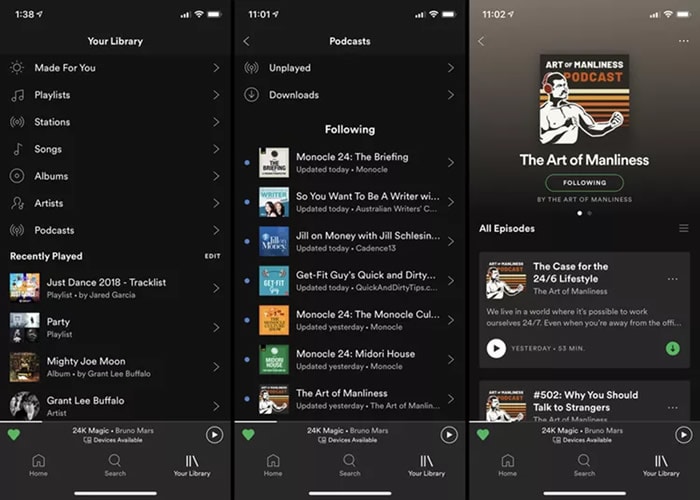
Step3 To find the downloaded podcast, go to Your Library > Podcasts. Then, select Downloads to see the podcast files.
For Computer
The process of converting podcasts to MP3 on Spotify via computer is similar to using a mobile device. You just need to do the following;
Step1 Open the Spotify app and login into your account.
Step2 Locate the Podcast that you wish to convert to MP3.
Step3 Move your cursor over the podcast episode you want to convert. Then, click the Download icon next to it to convert it to MP3.
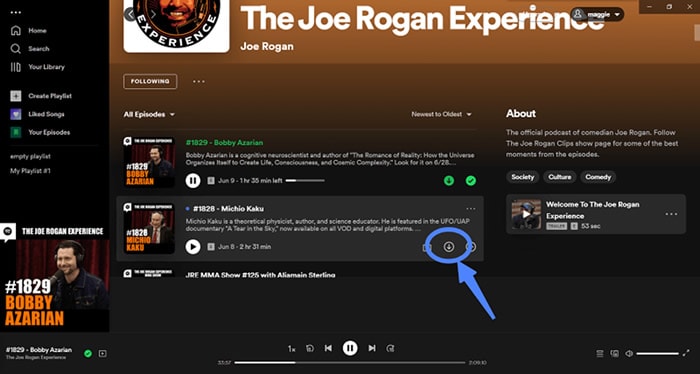
![]()
Note: You must have a premium Spotify account to be able to download podcasts.
Way 2: Convert podcasts to mp3 by online converters or converting software
If the Podcast you’re looking to convert to MP3 is not on a podcast manager, don’t panic. Tech experts have innovated various online tools that can also be used to convert podcasts to MP3s. So, if the Podcast you want to convert to MP3 is saved as a file on your device, you can employ a reliable online converter to execute the operation without compromising the quality of the Podcast.
We’ve curated a list of some online converters you can use below;
1. Convert Podcasts to MP3 with Uniconverter
Wondershare Uniconverter is a video/audio conversion tool that allows the conversion of files in various formats to another format without compromising the file’s quality. The tool is used by professionals to convert podcasts to MP3, as it boasts fast conversion speed and has a clean interface that makes it very easy to use.
Here is how to use Uniconverter to convert podcasts to MP3;
Step1 Install the Uniconverter software on your PC or macOS.
Step2 Click the Convert function from the top-left side. Then, use the Add Fies button at the top left corner of the screen to upload the podcast file that you’re looking to convert.
![]()
Step3 Click the drop-down icon next to Output Format. Then, select Audio > MP3 and choose the quality you want the output file to be.
![]()
Step4 Click File Location from the bottom left corner and select the path where you want the output file to be saved. Then, click Convert to start converting the podcast to MP3. This will take only a few minutes to complete.
![]()
Pros
- Convert unlimited podcasts to MP3 for free.
- Fast conversion speed.
- Supports batch conversion.
- It’s safe.
Cons
- It requires installation.
- You need to upgrade to premium to access all its features.
2. Convert Podcasts to MP3 Online with Media.io
The above method requires you to install a third-party app. But if you prefer using an online podcast converter, then Media.io is one of the best choices that’s worth trying. The tool allows you to quickly convert audio files into various formats safely and securely online.
Follow the following steps to use Media.io to convert your podcast;
Step1 Open theMedia.io Online Audio Converter tool on your browser and click Choose Files to upload the podcast file(s) you’re looking to convert. You can also upload the file from Google Drive, Dropbox, or via YouTube URL.
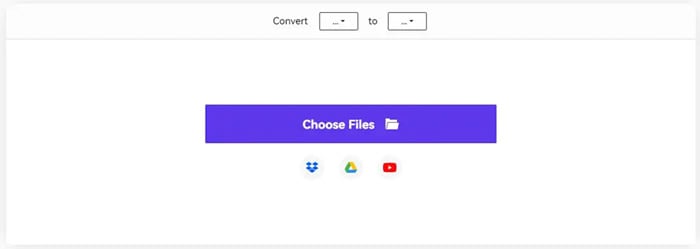
Step2 Click the drop-down icon next to To and select Audio. Then, choose MP3 as the preferred output format and click Convert to begin the conversion process.
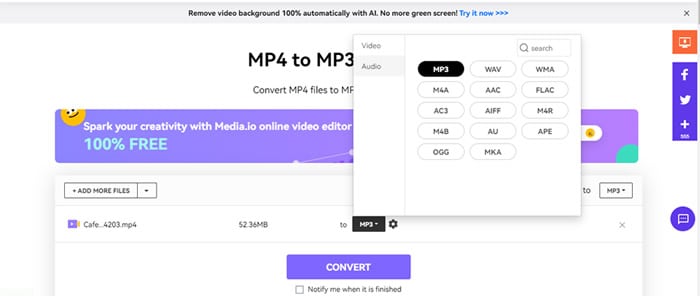
Step3 Once the file has been successfully converted to MP3, click the Download button to save it to your device’s local storage.
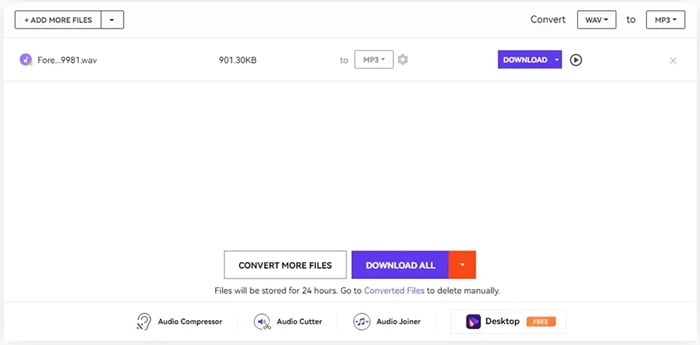
Pros
- It’s easy to operate.
- It’s safe and secure.
- No watermark.
- Fast conversion speed.
Cons
- It uploads files slowly.
3. Convert Podcast to MP3 With Online-Convert
If Media.io does not have what it takes to suit your requirements, Online-Convert is another excellent tool that can help you convert audio files from one format to another. Though it’s not 100% free like Media.io.
Here is how to use Online-Convert to convert podcast to MP3 online;
Step1 Open Online Convert online Audio to MP3 converter in your browser and click Choose File to upload the podcast file that you want to convert.

Step2 Click Start to begin the conversion.

Step3 Finally, click Download to save the converted file to your storage.

Pros
- Convert podcasts to MP3 without installing a third-party app.
- It’s easy to use.
- Supports simultaneous conversion of multiple podcast files.
Cons
- You must upgrade your account to be able to convert unlimited podcast files to MP3.
Way 3: Convert podcast to mp3 via iTunes
Besides music streaming, Apple iTunes also allows the conversion of audio files from one format to another. So, if you’ve got iTunes installed on your PC or Mac, you can easily employ it to convert the podcast to MP3. But this might not be a reliable option if you looking to convert many podcast episodes to MP3.
See the steps to convert podcast to MP3 with iTunes;
Step1 Open the iTunes app on your computer and click File from the top-left. Then, select Add File to Library to upload the podcast that you’re looking to convert.
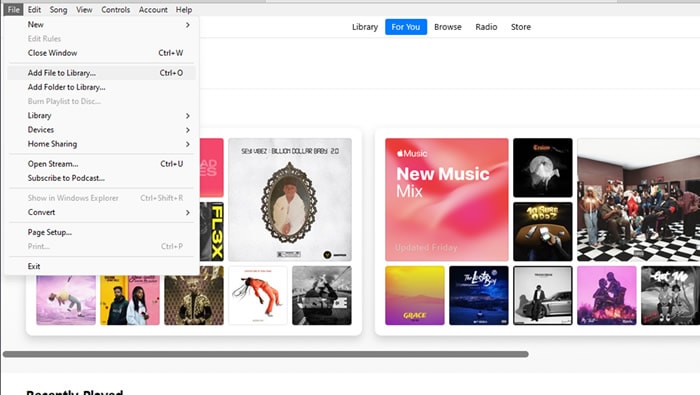
Step2 Once you upload the podcast, click Edit from the top bar. Then, select Preferences.
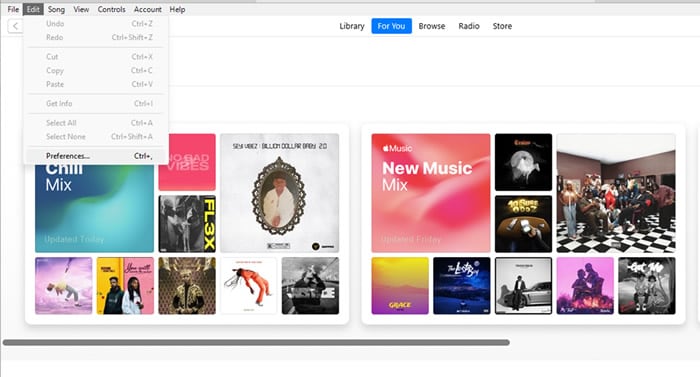
Step3 Click the General tab and select Import Settings.
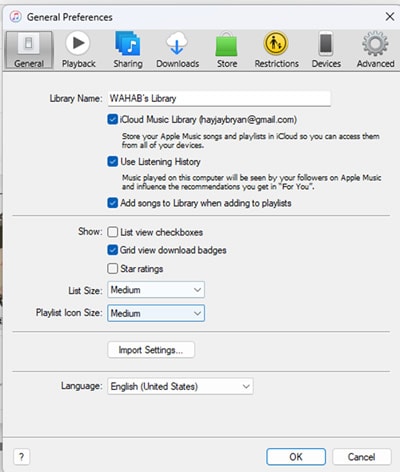
- Click the drop-down icon next to Import Using and select MP3 Encoder. Then, click OK.
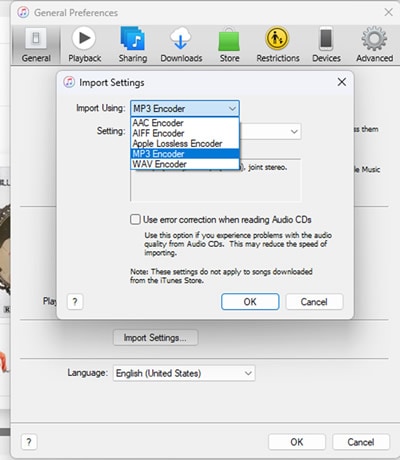
Step4 Click File from the top-left side once again. Then, select Convert > Create MP3 version.
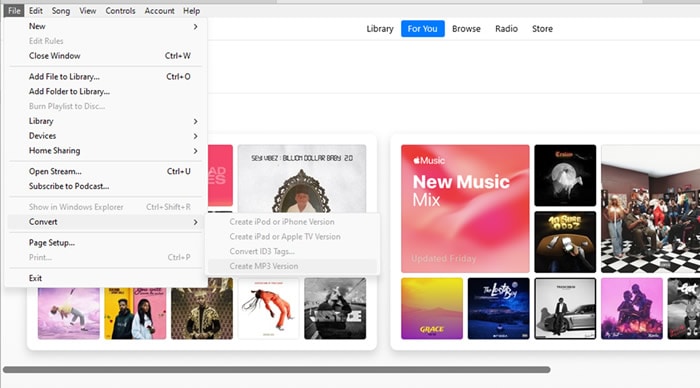
You’ve successfully converted the podcast to MP3!
Pros & Cons of using iTunes to Convert Podcasts to MP3
Pros
- It’s free.
- It’s easy to use.
- It does not reduce podcast quality.
Cons
- It’s not efficient for converting many podcast files.
Part 4. Tips & Tricks for Podcast to MP3 Conversion
- Convert Multiple Podcast Files Simultaneously: If you have a bunch of podcasts to convert to MP3, it’s advisable to use online tools or software like the ones mentioned in the article above to convert all of them at once. It saves you from unwanted stress and wasting your time.
- Add Podcasts to “My Favorites” or “Save to My Library: Add all podcasts you wish to convert to “My Favorites” or save them to your library so you can easily locate them.
- Ensure to have a stable internet connection when using an online tool: Make sure you have a stable internet connection when using online audio converters to convert podcasts to MP3. It makes the process smooth and straightforward.
Final Words
The above techniques are efficient for converting podcasts to MP3. As you can see, it does not matter whether you’re looking to use a podcast manager app like Spotify, online converter, software, or iTunes, the steps are very easy to employ.
Overall, make sure you read the pros and cons attached to using each method so you can choose the one that suits your requirements.
Way 2: Convert podcasts to mp3 by online converters or converting software
If the Podcast you’re looking to convert to MP3 is not on a podcast manager, don’t panic. Tech experts have innovated various online tools that can also be used to convert podcasts to MP3s. So, if the Podcast you want to convert to MP3 is saved as a file on your device, you can employ a reliable online converter to execute the operation without compromising the quality of the Podcast.
We’ve curated a list of some online converters you can use below;
1. Convert Podcasts to MP3 with Uniconverter
Wondershare Uniconverter is a video/audio conversion tool that allows the conversion of files in various formats to another format without compromising the file’s quality. The tool is used by professionals to convert podcasts to MP3, as it boasts fast conversion speed and has a clean interface that makes it very easy to use.
Here is how to use Uniconverter to convert podcasts to MP3;
Step1 Install the Uniconverter software on your PC or macOS.
Step2 Click the Convert function from the top-left side. Then, use the Add Fies button at the top left corner of the screen to upload the podcast file that you’re looking to convert.
![]()
Step3 Click the drop-down icon next to Output Format. Then, select Audio > MP3 and choose the quality you want the output file to be.
![]()
Step4 Click File Location from the bottom left corner and select the path where you want the output file to be saved. Then, click Convert to start converting the podcast to MP3. This will take only a few minutes to complete.
![]()
Pros
- Convert unlimited podcasts to MP3 for free.
- Fast conversion speed.
- Supports batch conversion.
- It’s safe.
Cons
- It requires installation.
- You need to upgrade to premium to access all its features.
2. Convert Podcasts to MP3 Online with Media.io
The above method requires you to install a third-party app. But if you prefer using an online podcast converter, then Media.io is one of the best choices that’s worth trying. The tool allows you to quickly convert audio files into various formats safely and securely online.
Follow the following steps to use Media.io to convert your podcast;
Step1 Open theMedia.io Online Audio Converter tool on your browser and click Choose Files to upload the podcast file(s) you’re looking to convert. You can also upload the file from Google Drive, Dropbox, or via YouTube URL.

Step2 Click the drop-down icon next to To and select Audio. Then, choose MP3 as the preferred output format and click Convert to begin the conversion process.

Step3 Once the file has been successfully converted to MP3, click the Download button to save it to your device’s local storage.

Pros
- It’s easy to operate.
- It’s safe and secure.
- No watermark.
- Fast conversion speed.
Cons
- It uploads files slowly.
3. Convert Podcast to MP3 With Online-Convert
If Media.io does not have what it takes to suit your requirements, Online-Convert is another excellent tool that can help you convert audio files from one format to another. Though it’s not 100% free like Media.io.
Here is how to use Online-Convert to convert podcast to MP3 online;
Step1 Open Online Convert online Audio to MP3 converter in your browser and click Choose File to upload the podcast file that you want to convert.

Step2 Click Start to begin the conversion.

Step3 Finally, click Download to save the converted file to your storage.

Pros
- Convert podcasts to MP3 without installing a third-party app.
- It’s easy to use.
- Supports simultaneous conversion of multiple podcast files.
Cons
- You must upgrade your account to be able to convert unlimited podcast files to MP3.
Way 3: Convert podcast to mp3 via iTunes
Besides music streaming, Apple iTunes also allows the conversion of audio files from one format to another. So, if you’ve got iTunes installed on your PC or Mac, you can easily employ it to convert the podcast to MP3. But this might not be a reliable option if you looking to convert many podcast episodes to MP3.
See the steps to convert podcast to MP3 with iTunes;
Step1 Open the iTunes app on your computer and click File from the top-left. Then, select Add File to Library to upload the podcast that you’re looking to convert.

Step2 Once you upload the podcast, click Edit from the top bar. Then, select Preferences.

Step3 Click the General tab and select Import Settings.

- Click the drop-down icon next to Import Using and select MP3 Encoder. Then, click OK.

Step4 Click File from the top-left side once again. Then, select Convert > Create MP3 version.

You’ve successfully converted the podcast to MP3!
Pros & Cons of using iTunes to Convert Podcasts to MP3
Pros
- It’s free.
- It’s easy to use.
- It does not reduce podcast quality.
Cons
- It’s not efficient for converting many podcast files.
Part 4. Tips & Tricks for Podcast to MP3 Conversion
- Convert Multiple Podcast Files Simultaneously: If you have a bunch of podcasts to convert to MP3, it’s advisable to use online tools or software like the ones mentioned in the article above to convert all of them at once. It saves you from unwanted stress and wasting your time.
- Add Podcasts to “My Favorites” or “Save to My Library: Add all podcasts you wish to convert to “My Favorites” or save them to your library so you can easily locate them.
- Ensure to have a stable internet connection when using an online tool: Make sure you have a stable internet connection when using online audio converters to convert podcasts to MP3. It makes the process smooth and straightforward.
Final Words
The above techniques are efficient for converting podcasts to MP3. As you can see, it does not matter whether you’re looking to use a podcast manager app like Spotify, online converter, software, or iTunes, the steps are very easy to employ.
Overall, make sure you read the pros and cons attached to using each method so you can choose the one that suits your requirements.
Essential Guide to Top 10 Budget-Friendly Podcasting Software (Free)
10 Best Podcast Recording Software in 2024

Benjamin Arango
Mar 27, 2024• Proven solutions
Sharing our thoughts and opinions with likeminded people around the world has never been easier. Today, anyone with access to the right tools can start their own podcast and debate about the topics they find important. Besides individuals, a growing number of companies are using podcasts to build a loyal fan-base and ultimately improve their brand’s visibility and profits.
Each piece of equipment you use to produce a podcast can impact its quality, which is why you must choose carefully the audio recording software you are going to use to record new episodes for your podcast. Read on if you would like to find out more about the ten best podcast recording software products in 2024, that are going to ensure each new episode you record meets the highest industry standards.
Top 10 Podcast Recording Software in 2024
Creating a podcast is a straight forward process since you just need a quiet room, a microphone, and good audio recording software. However, there are hundreds of options on the market to choose from which makes finding the podcast recording software difficult. That’s why we’ve compiled the list of top ten podcast recording software products in 2019 that is going to help you choose an option that best meets your podcasting needs.
1. Logic Pro X
Price: $199,99
Compatibility: macOS
Seasoned podcasters don’t need a special introduction to Logic Pro X, because this DAW (Digital Audio Workstation) has been one of the highest praised audio editing software product in the industry for decades. Unsurprisingly, Logic Pro X’s audio recording features are too powerful for most podcasters, as they are aimed at professionals who design sound for full feature movies and similar demanding projects.
Adding sound effects, vintage EQs or simulating acoustic spaces are only a few among countless podcast editing tools Logic Pro X offers. However, producing podcasts with this DAW requires previous audio editing experience, so if you are new to podcasting it may take some time before you start feeling confident using Logic Pro X. Keep in mind that you can only use Logic Pro X on Mac computers that support 10.13.6 or later versions of the macOS.
Pros
- Offers professional audio recording tools
- A rich selection of plug-ins and sounds
- Supports 24-bit/192kHZ audio recording
- Over a thousand stereo or surround audio tracks can be added to the timeline
Cons
- Demanding technical requirements
- Only available on Mac computers
2. Adobe Audition
Price: $20,99 per month as a single app, free trial available
Compatibility: Windows, macOS
Audition has been a part of Adobe Creative Suite from the beginning, and over the course of the last couple of decades, it has established itself as one of the best audio editing software products on the market.
This DAW is equipped with a broad range of audio recording and editing tools that enable professionals to create soundtracks for different types of projects. A brief look at the Audition’s list of features will leave you wondering if there is anything this audio editing software cannot do since it enables its users to manipulate their recordings and all other types of audio files in any way they want. So, you shouldn’t look much further than Adobe Audition if you are looking for a software that allows you to record and edit each new episode of your podcast.
Pros
- Powerful Reverb and DeNoise effects
- Supports high-quality recording on more than 32 tracks
- Projects created in Adobe Premiere can be opened in Audition
- Offers batch processing features
Cons
- Provides more audio editing tools than most podcasters need
- Aimed only at professional users
3. GarageBand
Price: Free
Compatibility: macOS, iOS
This recording studio is a popular option among podcasters because it offers a wide range of audio recording features for free. GarageBand allows you to record songs on more than 250 tracks, take multiple recordings and select the best one or share the podcasts you record to SoundCloud.
In addition, this DAW makes mixing and mastering audio files look easy, and enables podcasters to polish their audio files before sharing them with their audience.
Moreover, GarageBand is equipped with a visual EQ that features 8 different color-coded bands that are arranged from bass to treble. The rich library of plugins this recording studio offers enables you to make your podcasts more diverse and dynamic so that you can surprise your listeners in each new episode you share online.
Pros
- Excellent podcast recording capabilities on all macOS and iOS devices
- Offers advanced audio editing tools
- Provides a wide range of file sharing options
- More affordable than most podcast recording software products
Cons
- Requires at least basic level of audio recording and audio editing experience
- Not available on a PC computer and Android devices
4. Hindenburg Journalist
Price: Free trial available, pricing plans start at $95
Compatibility: Windows, macOS
Accomplished podcasters, audio recording professionals or journalists can use Hindenburg Journalist to record conversations, interviews or create solo audio recordings. Besides recording new material, Hindenburg Journalist lets you import and edit all audio files regardless of their bit rates or sample rates.
The Voice Profiler tool creates EQs automatically and improves the quality of your recordings by balancing the highs and lows. Hindenburg Journalist is equipped with all audio editing tools you’re going to need to remove the mistakes you make during a podcast or apply fade-in and fade-out effects. Uploading podcasts directly to Loudness, Libsyn or Soundcloud directly from Hindenburg Journalist requires you to just select one of the available platforms. Optionally, you can add host, show and RSS details, set loudness levels or choose a new file format for your audio files.
Pros
- Simple audio recording setup
- Supports all types of audio files
- Generates EQs automatically
- Allows podcasters to upload audio files directly to Soundcloud, Loudness, and Libsyn
Cons
- More expensive than most podcast recording software products
- Features only basic audio editing tools
5. Audacity
Price: Free
Compatibility: macOS, Linux, Windows
Podcasters have been using Audacity to record their podcasts for decades. Even though Audacity’s interface may look a bit outdated, this cross-platform audio recorder and editor is still one of the best podcast recording software products you can find.
You can use Audacity to record live audio through a microphone or a mixer, as well as digitize audio files from other media. In addition, Audacity lets you choose if you want to create 16-bit, 24-bit, or 32-bit audio recordings. Each podcast you record can be easily edited, so you can cut or delete parts of recording you don’t want to include in the final version of your podcast. This iconic podcast recording software allows you to import or export nearly all types of audio files, but, you can’t upload your podcasts directly from the software to a podcast hosting platform.
Pros
- Offers a wide array of audio recording options for free
- Captures high-quality audio files
- Rich audio effects library
- Supports all of the most commonly used audio file formats
Cons
- Equipped with basic audio editing tools
- Outdated interface design
6. Zencastr
Price: Free, pricing plans start at $20,00 per month
Compatibility: web-based
Having new guests for each new episode of your podcast can be difficult at times since their schedules can be too busy. Zencastr resolves this issue by enabling its users to conduct interviews online.
You just have to send a link to your guest and this web-based podcast recorder will capture the interview in lossless 16-bit 44.1k quality. Zencastr separates tracks per guest which prevents quality drop-offs throughout the recording. The app’s Soundboard lets you add intros and outros to each new podcast your record in just a few clicks. All interviews you record with Zencastr are edited automatically, so you don’t have to spend time adjusting the file’s audio levels. However, the free version of Zencastr offers only limited capabilities, since you can only invite up to two guests and record the maximum of 8 hours of audio each month.
Pros
- No installation process
- Captures remote interviews in studio quality
- Zencastr enables users to voice chat directly from the app
- Offers 10 hours of automatic post-production each month
Cons
- The free version of Zencastr offers only limited capabilities
- Sharing an audio file recorded with Zencastr directly to a podcast hosting platform is not possible
7. Alitu
Price: $28,00 billed monthly or $280 billed annually
Compatibility: web-based
This online platform simplifies the process of creating a podcast by offering automatic audio editing services. You just have to upload the files you would like to edit and the Alitu is going to improve their quality.
The app’s theme maker lets you create soundtracks for your podcasts, while the id3 tags are added automatically to each audio file you process with Alitu. In addition, you can create a solo recording from the app, and post them on Podbean, Libsyn, Blubrry and other podcast hosting platforms. Even so, Alitu’s automatic audio editing features are not powerful enough to compete with more advanced and more affordable podcast recording software products. The app’s selection of audio filters and plugins is also quite limited, especially when its price is considered.
Pros
- The short and simple podcast production process
- Support for a broad spectrum of audio file formats
- Uploading podcasts directly to Libsyn, Buzzsprout or any other podcast hosting platform is easy
- Excellent noise removal capabilities
Cons
- Adjusting file’s audio settings manually isn’t an option
- Offers limited audio recording and editing features at a high price
8. ProTools
Price: Pricing plans start at $29,99 per month
Compatibility: Windows, macOS
This is probably one of the oldest DAW software products on the market, and certainly one of the best. ProTools is a professional audio recording and editing software that offers all features you can need while recording a new episode of your podcast.
Mixing multiple tracks or adding effects to your recordings are only a few out among the countless options you are going to have at your disposal if you choose to make your podcasts with ProTools. Furthermore, you’ll be able to collaborate with other members of your team through the cloud or share your work via the Avid Link app. The audio recording features ProTools offers can be overwhelming for newcomers to the world of podcasts, so if you don’t have previous audio recording experience it is better to opt for a less demanding podcast recording software.
9. Ringr
Price: Pricing plans start at $7,99 per month
Compatibility: iOS, Android, web-based
Conducting remote interviews with Ringr is easy, as you just have to schedule the interview and then connect via the Ringr app. As soon as the conversation starts, Ringer will start recording it and once the conversation is finished the audio file will be automatically uploaded to the Ringr platform.
The app will then merge the files it created for each participant of the conversation to improve the audio’s quality, although all recordings created with the Basic subscription plan are going to be saved as Mono MP3 files. Once the automatic audio editing process is completed you can proceed to download the conversation you recorded, but keep in mind that the Conference Calling options are only available if you choose a Premium or Enterprise, subscription models.
Pros
- Enables podcasters to conduct remote interviews
- Efficient call scheduling tools
- The number of calls you can make with Ringr isn’t limited
- Quick download process
Cons
- The quality of the recording depends on the pricing plan you purchase
- No audio editing tools
10. ecamm Call Recorder for Skype
Price: $39,95
Compatibility: macOS
ecamm Call Recorder for Skype is not a podcast recording software product, as it is primarily used as a tool that records Skype conversations . Podcasters who often conduct interviews through Skype can rely on this macOS application to capture their Skype calls.
After the recording session is completed you can choose if you want to export the recording as an MP3 audio file or as an HD video file. The lack of basic audio editing tools, effects or plugins makes ecamm Call Recorder for Skype a poor choice for all podcasters who want to polish the podcasts before sharing them with an online audience. This application for Mac computers can only be a complementary tool that enables podcasters to conduct remote interviews, but it cannot be your only choice if you want to create podcasts on a regular basis.
Pros
- Effortless recording session setup
- Lets its users export recordings as audio and video files
- Great for conducting interviews through Skype
- Requires no previous audio recording experience
Cons
- No audio editing tools
- Uploading audio files directly to podcast hosting services is not an option
| Podcast recording software | Best For | Supported OS | Price |
|---|---|---|---|
| Logic Pro X | Experienced podcasters | macOS | $199,99 |
| Adobe Audition | Experienced podcasters | Windows, macOS | $20,99 per month as a single app |
| GarageBand | Novice and intermediate podcasters | macOS, iOS | Free |
| Hindenburg Journalist | Journalists, podcasters and radio professionals | Windows, macOS | Pricing plans start at $95 |
| Audacity | Experienced podcasters | Linux, macOS, Windows | Free |
| Zencastr | Podcasters who conduct remote interviews | Web-based | Pricing plans start at $20,00 per month |
| Alitu | Novice and intermediate podcasters | Web-based | $28,00 billed monthly |
| ProTools | Experienced podcasters | Windows, macOS | $29,99 per month, different pricing options available |
| Ringr | Podcasters who conduct remote interviews | Android, iOS, web-based | Pricing plans start at $7,99 per month |
| ecamm Call Recorder for Skype | Podcasters who conduct remote interviews through Skype | macOS | $39,95 |
Each of the podcast recording software products we featured in this article offers excellent audio recording options and enables you to create high-quality podcasts. However, there is no need to purchase professional audio editing apps, if you just want to record high-quality audio files. Which podcast recording software product are you going to choose? Leave a comment below and share your opinions with us.

Benjamin Arango
Benjamin Arango is a writer and a lover of all things video.
Follow @Benjamin Arango
Benjamin Arango
Mar 27, 2024• Proven solutions
Sharing our thoughts and opinions with likeminded people around the world has never been easier. Today, anyone with access to the right tools can start their own podcast and debate about the topics they find important. Besides individuals, a growing number of companies are using podcasts to build a loyal fan-base and ultimately improve their brand’s visibility and profits.
Each piece of equipment you use to produce a podcast can impact its quality, which is why you must choose carefully the audio recording software you are going to use to record new episodes for your podcast. Read on if you would like to find out more about the ten best podcast recording software products in 2024, that are going to ensure each new episode you record meets the highest industry standards.
Top 10 Podcast Recording Software in 2024
Creating a podcast is a straight forward process since you just need a quiet room, a microphone, and good audio recording software. However, there are hundreds of options on the market to choose from which makes finding the podcast recording software difficult. That’s why we’ve compiled the list of top ten podcast recording software products in 2019 that is going to help you choose an option that best meets your podcasting needs.
1. Logic Pro X
Price: $199,99
Compatibility: macOS
Seasoned podcasters don’t need a special introduction to Logic Pro X, because this DAW (Digital Audio Workstation) has been one of the highest praised audio editing software product in the industry for decades. Unsurprisingly, Logic Pro X’s audio recording features are too powerful for most podcasters, as they are aimed at professionals who design sound for full feature movies and similar demanding projects.
Adding sound effects, vintage EQs or simulating acoustic spaces are only a few among countless podcast editing tools Logic Pro X offers. However, producing podcasts with this DAW requires previous audio editing experience, so if you are new to podcasting it may take some time before you start feeling confident using Logic Pro X. Keep in mind that you can only use Logic Pro X on Mac computers that support 10.13.6 or later versions of the macOS.
Pros
- Offers professional audio recording tools
- A rich selection of plug-ins and sounds
- Supports 24-bit/192kHZ audio recording
- Over a thousand stereo or surround audio tracks can be added to the timeline
Cons
- Demanding technical requirements
- Only available on Mac computers
2. Adobe Audition
Price: $20,99 per month as a single app, free trial available
Compatibility: Windows, macOS
Audition has been a part of Adobe Creative Suite from the beginning, and over the course of the last couple of decades, it has established itself as one of the best audio editing software products on the market.
This DAW is equipped with a broad range of audio recording and editing tools that enable professionals to create soundtracks for different types of projects. A brief look at the Audition’s list of features will leave you wondering if there is anything this audio editing software cannot do since it enables its users to manipulate their recordings and all other types of audio files in any way they want. So, you shouldn’t look much further than Adobe Audition if you are looking for a software that allows you to record and edit each new episode of your podcast.
Pros
- Powerful Reverb and DeNoise effects
- Supports high-quality recording on more than 32 tracks
- Projects created in Adobe Premiere can be opened in Audition
- Offers batch processing features
Cons
- Provides more audio editing tools than most podcasters need
- Aimed only at professional users
3. GarageBand
Price: Free
Compatibility: macOS, iOS
This recording studio is a popular option among podcasters because it offers a wide range of audio recording features for free. GarageBand allows you to record songs on more than 250 tracks, take multiple recordings and select the best one or share the podcasts you record to SoundCloud.
In addition, this DAW makes mixing and mastering audio files look easy, and enables podcasters to polish their audio files before sharing them with their audience.
Moreover, GarageBand is equipped with a visual EQ that features 8 different color-coded bands that are arranged from bass to treble. The rich library of plugins this recording studio offers enables you to make your podcasts more diverse and dynamic so that you can surprise your listeners in each new episode you share online.
Pros
- Excellent podcast recording capabilities on all macOS and iOS devices
- Offers advanced audio editing tools
- Provides a wide range of file sharing options
- More affordable than most podcast recording software products
Cons
- Requires at least basic level of audio recording and audio editing experience
- Not available on a PC computer and Android devices
4. Hindenburg Journalist
Price: Free trial available, pricing plans start at $95
Compatibility: Windows, macOS
Accomplished podcasters, audio recording professionals or journalists can use Hindenburg Journalist to record conversations, interviews or create solo audio recordings. Besides recording new material, Hindenburg Journalist lets you import and edit all audio files regardless of their bit rates or sample rates.
The Voice Profiler tool creates EQs automatically and improves the quality of your recordings by balancing the highs and lows. Hindenburg Journalist is equipped with all audio editing tools you’re going to need to remove the mistakes you make during a podcast or apply fade-in and fade-out effects. Uploading podcasts directly to Loudness, Libsyn or Soundcloud directly from Hindenburg Journalist requires you to just select one of the available platforms. Optionally, you can add host, show and RSS details, set loudness levels or choose a new file format for your audio files.
Pros
- Simple audio recording setup
- Supports all types of audio files
- Generates EQs automatically
- Allows podcasters to upload audio files directly to Soundcloud, Loudness, and Libsyn
Cons
- More expensive than most podcast recording software products
- Features only basic audio editing tools
5. Audacity
Price: Free
Compatibility: macOS, Linux, Windows
Podcasters have been using Audacity to record their podcasts for decades. Even though Audacity’s interface may look a bit outdated, this cross-platform audio recorder and editor is still one of the best podcast recording software products you can find.
You can use Audacity to record live audio through a microphone or a mixer, as well as digitize audio files from other media. In addition, Audacity lets you choose if you want to create 16-bit, 24-bit, or 32-bit audio recordings. Each podcast you record can be easily edited, so you can cut or delete parts of recording you don’t want to include in the final version of your podcast. This iconic podcast recording software allows you to import or export nearly all types of audio files, but, you can’t upload your podcasts directly from the software to a podcast hosting platform.
Pros
- Offers a wide array of audio recording options for free
- Captures high-quality audio files
- Rich audio effects library
- Supports all of the most commonly used audio file formats
Cons
- Equipped with basic audio editing tools
- Outdated interface design
6. Zencastr
Price: Free, pricing plans start at $20,00 per month
Compatibility: web-based
Having new guests for each new episode of your podcast can be difficult at times since their schedules can be too busy. Zencastr resolves this issue by enabling its users to conduct interviews online.
You just have to send a link to your guest and this web-based podcast recorder will capture the interview in lossless 16-bit 44.1k quality. Zencastr separates tracks per guest which prevents quality drop-offs throughout the recording. The app’s Soundboard lets you add intros and outros to each new podcast your record in just a few clicks. All interviews you record with Zencastr are edited automatically, so you don’t have to spend time adjusting the file’s audio levels. However, the free version of Zencastr offers only limited capabilities, since you can only invite up to two guests and record the maximum of 8 hours of audio each month.
Pros
- No installation process
- Captures remote interviews in studio quality
- Zencastr enables users to voice chat directly from the app
- Offers 10 hours of automatic post-production each month
Cons
- The free version of Zencastr offers only limited capabilities
- Sharing an audio file recorded with Zencastr directly to a podcast hosting platform is not possible
7. Alitu
Price: $28,00 billed monthly or $280 billed annually
Compatibility: web-based
This online platform simplifies the process of creating a podcast by offering automatic audio editing services. You just have to upload the files you would like to edit and the Alitu is going to improve their quality.
The app’s theme maker lets you create soundtracks for your podcasts, while the id3 tags are added automatically to each audio file you process with Alitu. In addition, you can create a solo recording from the app, and post them on Podbean, Libsyn, Blubrry and other podcast hosting platforms. Even so, Alitu’s automatic audio editing features are not powerful enough to compete with more advanced and more affordable podcast recording software products. The app’s selection of audio filters and plugins is also quite limited, especially when its price is considered.
Pros
- The short and simple podcast production process
- Support for a broad spectrum of audio file formats
- Uploading podcasts directly to Libsyn, Buzzsprout or any other podcast hosting platform is easy
- Excellent noise removal capabilities
Cons
- Adjusting file’s audio settings manually isn’t an option
- Offers limited audio recording and editing features at a high price
8. ProTools
Price: Pricing plans start at $29,99 per month
Compatibility: Windows, macOS
This is probably one of the oldest DAW software products on the market, and certainly one of the best. ProTools is a professional audio recording and editing software that offers all features you can need while recording a new episode of your podcast.
Mixing multiple tracks or adding effects to your recordings are only a few out among the countless options you are going to have at your disposal if you choose to make your podcasts with ProTools. Furthermore, you’ll be able to collaborate with other members of your team through the cloud or share your work via the Avid Link app. The audio recording features ProTools offers can be overwhelming for newcomers to the world of podcasts, so if you don’t have previous audio recording experience it is better to opt for a less demanding podcast recording software.
9. Ringr
Price: Pricing plans start at $7,99 per month
Compatibility: iOS, Android, web-based
Conducting remote interviews with Ringr is easy, as you just have to schedule the interview and then connect via the Ringr app. As soon as the conversation starts, Ringer will start recording it and once the conversation is finished the audio file will be automatically uploaded to the Ringr platform.
The app will then merge the files it created for each participant of the conversation to improve the audio’s quality, although all recordings created with the Basic subscription plan are going to be saved as Mono MP3 files. Once the automatic audio editing process is completed you can proceed to download the conversation you recorded, but keep in mind that the Conference Calling options are only available if you choose a Premium or Enterprise, subscription models.
Pros
- Enables podcasters to conduct remote interviews
- Efficient call scheduling tools
- The number of calls you can make with Ringr isn’t limited
- Quick download process
Cons
- The quality of the recording depends on the pricing plan you purchase
- No audio editing tools
10. ecamm Call Recorder for Skype
Price: $39,95
Compatibility: macOS
ecamm Call Recorder for Skype is not a podcast recording software product, as it is primarily used as a tool that records Skype conversations . Podcasters who often conduct interviews through Skype can rely on this macOS application to capture their Skype calls.
After the recording session is completed you can choose if you want to export the recording as an MP3 audio file or as an HD video file. The lack of basic audio editing tools, effects or plugins makes ecamm Call Recorder for Skype a poor choice for all podcasters who want to polish the podcasts before sharing them with an online audience. This application for Mac computers can only be a complementary tool that enables podcasters to conduct remote interviews, but it cannot be your only choice if you want to create podcasts on a regular basis.
Pros
- Effortless recording session setup
- Lets its users export recordings as audio and video files
- Great for conducting interviews through Skype
- Requires no previous audio recording experience
Cons
- No audio editing tools
- Uploading audio files directly to podcast hosting services is not an option
| Podcast recording software | Best For | Supported OS | Price |
|---|---|---|---|
| Logic Pro X | Experienced podcasters | macOS | $199,99 |
| Adobe Audition | Experienced podcasters | Windows, macOS | $20,99 per month as a single app |
| GarageBand | Novice and intermediate podcasters | macOS, iOS | Free |
| Hindenburg Journalist | Journalists, podcasters and radio professionals | Windows, macOS | Pricing plans start at $95 |
| Audacity | Experienced podcasters | Linux, macOS, Windows | Free |
| Zencastr | Podcasters who conduct remote interviews | Web-based | Pricing plans start at $20,00 per month |
| Alitu | Novice and intermediate podcasters | Web-based | $28,00 billed monthly |
| ProTools | Experienced podcasters | Windows, macOS | $29,99 per month, different pricing options available |
| Ringr | Podcasters who conduct remote interviews | Android, iOS, web-based | Pricing plans start at $7,99 per month |
| ecamm Call Recorder for Skype | Podcasters who conduct remote interviews through Skype | macOS | $39,95 |
Each of the podcast recording software products we featured in this article offers excellent audio recording options and enables you to create high-quality podcasts. However, there is no need to purchase professional audio editing apps, if you just want to record high-quality audio files. Which podcast recording software product are you going to choose? Leave a comment below and share your opinions with us.

Benjamin Arango
Benjamin Arango is a writer and a lover of all things video.
Follow @Benjamin Arango
Benjamin Arango
Mar 27, 2024• Proven solutions
Sharing our thoughts and opinions with likeminded people around the world has never been easier. Today, anyone with access to the right tools can start their own podcast and debate about the topics they find important. Besides individuals, a growing number of companies are using podcasts to build a loyal fan-base and ultimately improve their brand’s visibility and profits.
Each piece of equipment you use to produce a podcast can impact its quality, which is why you must choose carefully the audio recording software you are going to use to record new episodes for your podcast. Read on if you would like to find out more about the ten best podcast recording software products in 2024, that are going to ensure each new episode you record meets the highest industry standards.
Top 10 Podcast Recording Software in 2024
Creating a podcast is a straight forward process since you just need a quiet room, a microphone, and good audio recording software. However, there are hundreds of options on the market to choose from which makes finding the podcast recording software difficult. That’s why we’ve compiled the list of top ten podcast recording software products in 2019 that is going to help you choose an option that best meets your podcasting needs.
1. Logic Pro X
Price: $199,99
Compatibility: macOS
Seasoned podcasters don’t need a special introduction to Logic Pro X, because this DAW (Digital Audio Workstation) has been one of the highest praised audio editing software product in the industry for decades. Unsurprisingly, Logic Pro X’s audio recording features are too powerful for most podcasters, as they are aimed at professionals who design sound for full feature movies and similar demanding projects.
Adding sound effects, vintage EQs or simulating acoustic spaces are only a few among countless podcast editing tools Logic Pro X offers. However, producing podcasts with this DAW requires previous audio editing experience, so if you are new to podcasting it may take some time before you start feeling confident using Logic Pro X. Keep in mind that you can only use Logic Pro X on Mac computers that support 10.13.6 or later versions of the macOS.
Pros
- Offers professional audio recording tools
- A rich selection of plug-ins and sounds
- Supports 24-bit/192kHZ audio recording
- Over a thousand stereo or surround audio tracks can be added to the timeline
Cons
- Demanding technical requirements
- Only available on Mac computers
2. Adobe Audition
Price: $20,99 per month as a single app, free trial available
Compatibility: Windows, macOS
Audition has been a part of Adobe Creative Suite from the beginning, and over the course of the last couple of decades, it has established itself as one of the best audio editing software products on the market.
This DAW is equipped with a broad range of audio recording and editing tools that enable professionals to create soundtracks for different types of projects. A brief look at the Audition’s list of features will leave you wondering if there is anything this audio editing software cannot do since it enables its users to manipulate their recordings and all other types of audio files in any way they want. So, you shouldn’t look much further than Adobe Audition if you are looking for a software that allows you to record and edit each new episode of your podcast.
Pros
- Powerful Reverb and DeNoise effects
- Supports high-quality recording on more than 32 tracks
- Projects created in Adobe Premiere can be opened in Audition
- Offers batch processing features
Cons
- Provides more audio editing tools than most podcasters need
- Aimed only at professional users
3. GarageBand
Price: Free
Compatibility: macOS, iOS
This recording studio is a popular option among podcasters because it offers a wide range of audio recording features for free. GarageBand allows you to record songs on more than 250 tracks, take multiple recordings and select the best one or share the podcasts you record to SoundCloud.
In addition, this DAW makes mixing and mastering audio files look easy, and enables podcasters to polish their audio files before sharing them with their audience.
Moreover, GarageBand is equipped with a visual EQ that features 8 different color-coded bands that are arranged from bass to treble. The rich library of plugins this recording studio offers enables you to make your podcasts more diverse and dynamic so that you can surprise your listeners in each new episode you share online.
Pros
- Excellent podcast recording capabilities on all macOS and iOS devices
- Offers advanced audio editing tools
- Provides a wide range of file sharing options
- More affordable than most podcast recording software products
Cons
- Requires at least basic level of audio recording and audio editing experience
- Not available on a PC computer and Android devices
4. Hindenburg Journalist
Price: Free trial available, pricing plans start at $95
Compatibility: Windows, macOS
Accomplished podcasters, audio recording professionals or journalists can use Hindenburg Journalist to record conversations, interviews or create solo audio recordings. Besides recording new material, Hindenburg Journalist lets you import and edit all audio files regardless of their bit rates or sample rates.
The Voice Profiler tool creates EQs automatically and improves the quality of your recordings by balancing the highs and lows. Hindenburg Journalist is equipped with all audio editing tools you’re going to need to remove the mistakes you make during a podcast or apply fade-in and fade-out effects. Uploading podcasts directly to Loudness, Libsyn or Soundcloud directly from Hindenburg Journalist requires you to just select one of the available platforms. Optionally, you can add host, show and RSS details, set loudness levels or choose a new file format for your audio files.
Pros
- Simple audio recording setup
- Supports all types of audio files
- Generates EQs automatically
- Allows podcasters to upload audio files directly to Soundcloud, Loudness, and Libsyn
Cons
- More expensive than most podcast recording software products
- Features only basic audio editing tools
5. Audacity
Price: Free
Compatibility: macOS, Linux, Windows
Podcasters have been using Audacity to record their podcasts for decades. Even though Audacity’s interface may look a bit outdated, this cross-platform audio recorder and editor is still one of the best podcast recording software products you can find.
You can use Audacity to record live audio through a microphone or a mixer, as well as digitize audio files from other media. In addition, Audacity lets you choose if you want to create 16-bit, 24-bit, or 32-bit audio recordings. Each podcast you record can be easily edited, so you can cut or delete parts of recording you don’t want to include in the final version of your podcast. This iconic podcast recording software allows you to import or export nearly all types of audio files, but, you can’t upload your podcasts directly from the software to a podcast hosting platform.
Pros
- Offers a wide array of audio recording options for free
- Captures high-quality audio files
- Rich audio effects library
- Supports all of the most commonly used audio file formats
Cons
- Equipped with basic audio editing tools
- Outdated interface design
6. Zencastr
Price: Free, pricing plans start at $20,00 per month
Compatibility: web-based
Having new guests for each new episode of your podcast can be difficult at times since their schedules can be too busy. Zencastr resolves this issue by enabling its users to conduct interviews online.
You just have to send a link to your guest and this web-based podcast recorder will capture the interview in lossless 16-bit 44.1k quality. Zencastr separates tracks per guest which prevents quality drop-offs throughout the recording. The app’s Soundboard lets you add intros and outros to each new podcast your record in just a few clicks. All interviews you record with Zencastr are edited automatically, so you don’t have to spend time adjusting the file’s audio levels. However, the free version of Zencastr offers only limited capabilities, since you can only invite up to two guests and record the maximum of 8 hours of audio each month.
Pros
- No installation process
- Captures remote interviews in studio quality
- Zencastr enables users to voice chat directly from the app
- Offers 10 hours of automatic post-production each month
Cons
- The free version of Zencastr offers only limited capabilities
- Sharing an audio file recorded with Zencastr directly to a podcast hosting platform is not possible
7. Alitu
Price: $28,00 billed monthly or $280 billed annually
Compatibility: web-based
This online platform simplifies the process of creating a podcast by offering automatic audio editing services. You just have to upload the files you would like to edit and the Alitu is going to improve their quality.
The app’s theme maker lets you create soundtracks for your podcasts, while the id3 tags are added automatically to each audio file you process with Alitu. In addition, you can create a solo recording from the app, and post them on Podbean, Libsyn, Blubrry and other podcast hosting platforms. Even so, Alitu’s automatic audio editing features are not powerful enough to compete with more advanced and more affordable podcast recording software products. The app’s selection of audio filters and plugins is also quite limited, especially when its price is considered.
Pros
- The short and simple podcast production process
- Support for a broad spectrum of audio file formats
- Uploading podcasts directly to Libsyn, Buzzsprout or any other podcast hosting platform is easy
- Excellent noise removal capabilities
Cons
- Adjusting file’s audio settings manually isn’t an option
- Offers limited audio recording and editing features at a high price
8. ProTools
Price: Pricing plans start at $29,99 per month
Compatibility: Windows, macOS
This is probably one of the oldest DAW software products on the market, and certainly one of the best. ProTools is a professional audio recording and editing software that offers all features you can need while recording a new episode of your podcast.
Mixing multiple tracks or adding effects to your recordings are only a few out among the countless options you are going to have at your disposal if you choose to make your podcasts with ProTools. Furthermore, you’ll be able to collaborate with other members of your team through the cloud or share your work via the Avid Link app. The audio recording features ProTools offers can be overwhelming for newcomers to the world of podcasts, so if you don’t have previous audio recording experience it is better to opt for a less demanding podcast recording software.
9. Ringr
Price: Pricing plans start at $7,99 per month
Compatibility: iOS, Android, web-based
Conducting remote interviews with Ringr is easy, as you just have to schedule the interview and then connect via the Ringr app. As soon as the conversation starts, Ringer will start recording it and once the conversation is finished the audio file will be automatically uploaded to the Ringr platform.
The app will then merge the files it created for each participant of the conversation to improve the audio’s quality, although all recordings created with the Basic subscription plan are going to be saved as Mono MP3 files. Once the automatic audio editing process is completed you can proceed to download the conversation you recorded, but keep in mind that the Conference Calling options are only available if you choose a Premium or Enterprise, subscription models.
Pros
- Enables podcasters to conduct remote interviews
- Efficient call scheduling tools
- The number of calls you can make with Ringr isn’t limited
- Quick download process
Cons
- The quality of the recording depends on the pricing plan you purchase
- No audio editing tools
10. ecamm Call Recorder for Skype
Price: $39,95
Compatibility: macOS
ecamm Call Recorder for Skype is not a podcast recording software product, as it is primarily used as a tool that records Skype conversations . Podcasters who often conduct interviews through Skype can rely on this macOS application to capture their Skype calls.
After the recording session is completed you can choose if you want to export the recording as an MP3 audio file or as an HD video file. The lack of basic audio editing tools, effects or plugins makes ecamm Call Recorder for Skype a poor choice for all podcasters who want to polish the podcasts before sharing them with an online audience. This application for Mac computers can only be a complementary tool that enables podcasters to conduct remote interviews, but it cannot be your only choice if you want to create podcasts on a regular basis.
Pros
- Effortless recording session setup
- Lets its users export recordings as audio and video files
- Great for conducting interviews through Skype
- Requires no previous audio recording experience
Cons
- No audio editing tools
- Uploading audio files directly to podcast hosting services is not an option
| Podcast recording software | Best For | Supported OS | Price |
|---|---|---|---|
| Logic Pro X | Experienced podcasters | macOS | $199,99 |
| Adobe Audition | Experienced podcasters | Windows, macOS | $20,99 per month as a single app |
| GarageBand | Novice and intermediate podcasters | macOS, iOS | Free |
| Hindenburg Journalist | Journalists, podcasters and radio professionals | Windows, macOS | Pricing plans start at $95 |
| Audacity | Experienced podcasters | Linux, macOS, Windows | Free |
| Zencastr | Podcasters who conduct remote interviews | Web-based | Pricing plans start at $20,00 per month |
| Alitu | Novice and intermediate podcasters | Web-based | $28,00 billed monthly |
| ProTools | Experienced podcasters | Windows, macOS | $29,99 per month, different pricing options available |
| Ringr | Podcasters who conduct remote interviews | Android, iOS, web-based | Pricing plans start at $7,99 per month |
| ecamm Call Recorder for Skype | Podcasters who conduct remote interviews through Skype | macOS | $39,95 |
Each of the podcast recording software products we featured in this article offers excellent audio recording options and enables you to create high-quality podcasts. However, there is no need to purchase professional audio editing apps, if you just want to record high-quality audio files. Which podcast recording software product are you going to choose? Leave a comment below and share your opinions with us.

Benjamin Arango
Benjamin Arango is a writer and a lover of all things video.
Follow @Benjamin Arango
Benjamin Arango
Mar 27, 2024• Proven solutions
Sharing our thoughts and opinions with likeminded people around the world has never been easier. Today, anyone with access to the right tools can start their own podcast and debate about the topics they find important. Besides individuals, a growing number of companies are using podcasts to build a loyal fan-base and ultimately improve their brand’s visibility and profits.
Each piece of equipment you use to produce a podcast can impact its quality, which is why you must choose carefully the audio recording software you are going to use to record new episodes for your podcast. Read on if you would like to find out more about the ten best podcast recording software products in 2024, that are going to ensure each new episode you record meets the highest industry standards.
Top 10 Podcast Recording Software in 2024
Creating a podcast is a straight forward process since you just need a quiet room, a microphone, and good audio recording software. However, there are hundreds of options on the market to choose from which makes finding the podcast recording software difficult. That’s why we’ve compiled the list of top ten podcast recording software products in 2019 that is going to help you choose an option that best meets your podcasting needs.
1. Logic Pro X
Price: $199,99
Compatibility: macOS
Seasoned podcasters don’t need a special introduction to Logic Pro X, because this DAW (Digital Audio Workstation) has been one of the highest praised audio editing software product in the industry for decades. Unsurprisingly, Logic Pro X’s audio recording features are too powerful for most podcasters, as they are aimed at professionals who design sound for full feature movies and similar demanding projects.
Adding sound effects, vintage EQs or simulating acoustic spaces are only a few among countless podcast editing tools Logic Pro X offers. However, producing podcasts with this DAW requires previous audio editing experience, so if you are new to podcasting it may take some time before you start feeling confident using Logic Pro X. Keep in mind that you can only use Logic Pro X on Mac computers that support 10.13.6 or later versions of the macOS.
Pros
- Offers professional audio recording tools
- A rich selection of plug-ins and sounds
- Supports 24-bit/192kHZ audio recording
- Over a thousand stereo or surround audio tracks can be added to the timeline
Cons
- Demanding technical requirements
- Only available on Mac computers
2. Adobe Audition
Price: $20,99 per month as a single app, free trial available
Compatibility: Windows, macOS
Audition has been a part of Adobe Creative Suite from the beginning, and over the course of the last couple of decades, it has established itself as one of the best audio editing software products on the market.
This DAW is equipped with a broad range of audio recording and editing tools that enable professionals to create soundtracks for different types of projects. A brief look at the Audition’s list of features will leave you wondering if there is anything this audio editing software cannot do since it enables its users to manipulate their recordings and all other types of audio files in any way they want. So, you shouldn’t look much further than Adobe Audition if you are looking for a software that allows you to record and edit each new episode of your podcast.
Pros
- Powerful Reverb and DeNoise effects
- Supports high-quality recording on more than 32 tracks
- Projects created in Adobe Premiere can be opened in Audition
- Offers batch processing features
Cons
- Provides more audio editing tools than most podcasters need
- Aimed only at professional users
3. GarageBand
Price: Free
Compatibility: macOS, iOS
This recording studio is a popular option among podcasters because it offers a wide range of audio recording features for free. GarageBand allows you to record songs on more than 250 tracks, take multiple recordings and select the best one or share the podcasts you record to SoundCloud.
In addition, this DAW makes mixing and mastering audio files look easy, and enables podcasters to polish their audio files before sharing them with their audience.
Moreover, GarageBand is equipped with a visual EQ that features 8 different color-coded bands that are arranged from bass to treble. The rich library of plugins this recording studio offers enables you to make your podcasts more diverse and dynamic so that you can surprise your listeners in each new episode you share online.
Pros
- Excellent podcast recording capabilities on all macOS and iOS devices
- Offers advanced audio editing tools
- Provides a wide range of file sharing options
- More affordable than most podcast recording software products
Cons
- Requires at least basic level of audio recording and audio editing experience
- Not available on a PC computer and Android devices
4. Hindenburg Journalist
Price: Free trial available, pricing plans start at $95
Compatibility: Windows, macOS
Accomplished podcasters, audio recording professionals or journalists can use Hindenburg Journalist to record conversations, interviews or create solo audio recordings. Besides recording new material, Hindenburg Journalist lets you import and edit all audio files regardless of their bit rates or sample rates.
The Voice Profiler tool creates EQs automatically and improves the quality of your recordings by balancing the highs and lows. Hindenburg Journalist is equipped with all audio editing tools you’re going to need to remove the mistakes you make during a podcast or apply fade-in and fade-out effects. Uploading podcasts directly to Loudness, Libsyn or Soundcloud directly from Hindenburg Journalist requires you to just select one of the available platforms. Optionally, you can add host, show and RSS details, set loudness levels or choose a new file format for your audio files.
Pros
- Simple audio recording setup
- Supports all types of audio files
- Generates EQs automatically
- Allows podcasters to upload audio files directly to Soundcloud, Loudness, and Libsyn
Cons
- More expensive than most podcast recording software products
- Features only basic audio editing tools
5. Audacity
Price: Free
Compatibility: macOS, Linux, Windows
Podcasters have been using Audacity to record their podcasts for decades. Even though Audacity’s interface may look a bit outdated, this cross-platform audio recorder and editor is still one of the best podcast recording software products you can find.
You can use Audacity to record live audio through a microphone or a mixer, as well as digitize audio files from other media. In addition, Audacity lets you choose if you want to create 16-bit, 24-bit, or 32-bit audio recordings. Each podcast you record can be easily edited, so you can cut or delete parts of recording you don’t want to include in the final version of your podcast. This iconic podcast recording software allows you to import or export nearly all types of audio files, but, you can’t upload your podcasts directly from the software to a podcast hosting platform.
Pros
- Offers a wide array of audio recording options for free
- Captures high-quality audio files
- Rich audio effects library
- Supports all of the most commonly used audio file formats
Cons
- Equipped with basic audio editing tools
- Outdated interface design
6. Zencastr
Price: Free, pricing plans start at $20,00 per month
Compatibility: web-based
Having new guests for each new episode of your podcast can be difficult at times since their schedules can be too busy. Zencastr resolves this issue by enabling its users to conduct interviews online.
You just have to send a link to your guest and this web-based podcast recorder will capture the interview in lossless 16-bit 44.1k quality. Zencastr separates tracks per guest which prevents quality drop-offs throughout the recording. The app’s Soundboard lets you add intros and outros to each new podcast your record in just a few clicks. All interviews you record with Zencastr are edited automatically, so you don’t have to spend time adjusting the file’s audio levels. However, the free version of Zencastr offers only limited capabilities, since you can only invite up to two guests and record the maximum of 8 hours of audio each month.
Pros
- No installation process
- Captures remote interviews in studio quality
- Zencastr enables users to voice chat directly from the app
- Offers 10 hours of automatic post-production each month
Cons
- The free version of Zencastr offers only limited capabilities
- Sharing an audio file recorded with Zencastr directly to a podcast hosting platform is not possible
7. Alitu
Price: $28,00 billed monthly or $280 billed annually
Compatibility: web-based
This online platform simplifies the process of creating a podcast by offering automatic audio editing services. You just have to upload the files you would like to edit and the Alitu is going to improve their quality.
The app’s theme maker lets you create soundtracks for your podcasts, while the id3 tags are added automatically to each audio file you process with Alitu. In addition, you can create a solo recording from the app, and post them on Podbean, Libsyn, Blubrry and other podcast hosting platforms. Even so, Alitu’s automatic audio editing features are not powerful enough to compete with more advanced and more affordable podcast recording software products. The app’s selection of audio filters and plugins is also quite limited, especially when its price is considered.
Pros
- The short and simple podcast production process
- Support for a broad spectrum of audio file formats
- Uploading podcasts directly to Libsyn, Buzzsprout or any other podcast hosting platform is easy
- Excellent noise removal capabilities
Cons
- Adjusting file’s audio settings manually isn’t an option
- Offers limited audio recording and editing features at a high price
8. ProTools
Price: Pricing plans start at $29,99 per month
Compatibility: Windows, macOS
This is probably one of the oldest DAW software products on the market, and certainly one of the best. ProTools is a professional audio recording and editing software that offers all features you can need while recording a new episode of your podcast.
Mixing multiple tracks or adding effects to your recordings are only a few out among the countless options you are going to have at your disposal if you choose to make your podcasts with ProTools. Furthermore, you’ll be able to collaborate with other members of your team through the cloud or share your work via the Avid Link app. The audio recording features ProTools offers can be overwhelming for newcomers to the world of podcasts, so if you don’t have previous audio recording experience it is better to opt for a less demanding podcast recording software.
9. Ringr
Price: Pricing plans start at $7,99 per month
Compatibility: iOS, Android, web-based
Conducting remote interviews with Ringr is easy, as you just have to schedule the interview and then connect via the Ringr app. As soon as the conversation starts, Ringer will start recording it and once the conversation is finished the audio file will be automatically uploaded to the Ringr platform.
The app will then merge the files it created for each participant of the conversation to improve the audio’s quality, although all recordings created with the Basic subscription plan are going to be saved as Mono MP3 files. Once the automatic audio editing process is completed you can proceed to download the conversation you recorded, but keep in mind that the Conference Calling options are only available if you choose a Premium or Enterprise, subscription models.
Pros
- Enables podcasters to conduct remote interviews
- Efficient call scheduling tools
- The number of calls you can make with Ringr isn’t limited
- Quick download process
Cons
- The quality of the recording depends on the pricing plan you purchase
- No audio editing tools
10. ecamm Call Recorder for Skype
Price: $39,95
Compatibility: macOS
ecamm Call Recorder for Skype is not a podcast recording software product, as it is primarily used as a tool that records Skype conversations . Podcasters who often conduct interviews through Skype can rely on this macOS application to capture their Skype calls.
After the recording session is completed you can choose if you want to export the recording as an MP3 audio file or as an HD video file. The lack of basic audio editing tools, effects or plugins makes ecamm Call Recorder for Skype a poor choice for all podcasters who want to polish the podcasts before sharing them with an online audience. This application for Mac computers can only be a complementary tool that enables podcasters to conduct remote interviews, but it cannot be your only choice if you want to create podcasts on a regular basis.
Pros
- Effortless recording session setup
- Lets its users export recordings as audio and video files
- Great for conducting interviews through Skype
- Requires no previous audio recording experience
Cons
- No audio editing tools
- Uploading audio files directly to podcast hosting services is not an option
| Podcast recording software | Best For | Supported OS | Price |
|---|---|---|---|
| Logic Pro X | Experienced podcasters | macOS | $199,99 |
| Adobe Audition | Experienced podcasters | Windows, macOS | $20,99 per month as a single app |
| GarageBand | Novice and intermediate podcasters | macOS, iOS | Free |
| Hindenburg Journalist | Journalists, podcasters and radio professionals | Windows, macOS | Pricing plans start at $95 |
| Audacity | Experienced podcasters | Linux, macOS, Windows | Free |
| Zencastr | Podcasters who conduct remote interviews | Web-based | Pricing plans start at $20,00 per month |
| Alitu | Novice and intermediate podcasters | Web-based | $28,00 billed monthly |
| ProTools | Experienced podcasters | Windows, macOS | $29,99 per month, different pricing options available |
| Ringr | Podcasters who conduct remote interviews | Android, iOS, web-based | Pricing plans start at $7,99 per month |
| ecamm Call Recorder for Skype | Podcasters who conduct remote interviews through Skype | macOS | $39,95 |
Each of the podcast recording software products we featured in this article offers excellent audio recording options and enables you to create high-quality podcasts. However, there is no need to purchase professional audio editing apps, if you just want to record high-quality audio files. Which podcast recording software product are you going to choose? Leave a comment below and share your opinions with us.

Benjamin Arango
Benjamin Arango is a writer and a lover of all things video.
Follow @Benjamin Arango
Also read:
- New 2024 Approved Premium Platforms for Acquiring Wildlife and Nature Sounds
- Updated 2024 Approved High-Quality Car Audio Conjunction with Mac Compatibility
- In 2024, Leading Speech-to-Text Solutions for Microsoft OS Ranking
- New Unleashing the Tremors Deepening Vocal Impact with Filmora Techniques for 2024
- Updated In 2024, Vimeo Video Information Aspect Ratio Included
- VocalTune Hub Deciphering the Technology, Praise From Users, and What Else You Should Explore for 2024
- Capturing Sounds on the Go A Guide to Free Audio Recording with Audacity
- Soundtracking Fear Ranking Websites Specializing in Scary Sounds and Effects for 2024
- Updated Apowersoft for Sound Mastery An In-Depth Tutorial and Review of 4 Competing Technologies
- Updated 2024 Approved How to Change Pitch in Audacity? Without Losing Quality
- New Techniques for Integrating Audio Tracks Into Moving Pictures Without Payment
- 2024 Approved Best 10 Speech to Text Software/Converters for Windows
- New In 2024, Complete Vimeo Media File Data with Aspect Ratio Highlighted
- New In 2024, Free Online Speech Transcription The Best Recorders of the Year so Far
- Updated 2024 Approved The Alluring Beauty of Cutting-Edge Sound Editing Tools Evaluating Pros, Cons, and Competitive Landscapes
- The Process of Purging Audio Content in the Latest AVI Codec
- Updated 2024 Approved Four Simple Steps to Silence TikTok Sounds Effectively
- Updated The Complete Story of Vimeo Videos Analyzing How Different Aspect Ratios Influence Viewing Experience
- New Transform Your Tunes Free Online Tool to Dial Back MP3 Volume, Ideal for Karaoke Enthusiasts.
- Add Music to Final Cut Pro for 2024
- Updated Tail Wags & Whispers Dognoise Auditory Experience for 2024
- Best Video Editing Software to Remove Audio From Video For Windows for 2024
- Updated Complete Examination of Nero Digital Music Production Software
- Updated 2024 Approved Unveiling the Top 8 Sonic Signatures for YouTube Creators Opening Moments
- New Voice Recording on Android Unveiled Discovering the Top 10 Apps for 2024
- Clearing the Gusts Advanced Methods for Removing Wind Effects From Podcasts for 2024
- Updated How to Merge Video and Audio for 2024
- New Revamp Your Sound Engineering Installing and Configuring Lame MP3 Encoder for Audacity for 2024
- New Mastering Your Music on a Chromebook The Top 8 DAWs that Will Elevate Your Sound (Updated List, 2023)
- New In 2024, Securing an Annotate-Free Video Experience Tips for New AVI Users
- 2024 Approved How to Install and Uninstall Audacity on Ubuntu
- Revolutionary MP3 File Management Toolkit Windows & Mac Edition, Leading the Industry
- In 2024, Expertise in Voice Transformation Leading Solutions
- New A Deep Dive Into Voice Recordings via Vocaroo Steps & Similar Solutions for 2024
- New Freely Accessible Comedy Soundtracks 5 Recommended Sources for Video Editors for 2024
- New In 2024, Audiophiles Guide to MP3 Enhancement Fundamental Strategies
- Updated Soundtrack Sanctuary The Finest Websites Offering Free Audio Selections for Filmmakers for 2024
- Updated Revolutionize Your Online Gaming with Morphvox – A Voice Changers Handbook
- Updated Modern Guide to MKV Audio Removal Update Users
- How To Change Country on App Store for iPhone 15 Plus With 7 Methods | Dr.fone
- Why is iPogo not working On Xiaomi Redmi Note 12 5G? Fixed | Dr.fone
- What is the best Pokemon for pokemon pvp ranking On Samsung Galaxy S23? | Dr.fone
- 5 Techniques to Transfer Data from Honor Magic5 Ultimate to iPhone 15/14/13/12 | Dr.fone
- New 2024 Approved Loop Your Favorite Videos for Free on Windows and Mac
- How To Remove Passcode From Apple iPhone 12 Pro Max? Complete Guide | Dr.fone
- New Gaming Intro Mastery The Top 10 Online Tools You Need to Know
- Updated Top-Rated AVCHD Editors Expert Recommendations
- Updated How to Translate TikTok Videos? All You Want to Know for 2024
- 2 Ways to Monitor Samsung Galaxy XCover 7 Activity | Dr.fone
- 9 Mind-Blowing Tricks to Hatch Eggs in Pokemon Go Without Walking On Vivo Y56 5G | Dr.fone
- Title: New 2024 Approved Transforming Your Speech Into Powerful Bass with Filmora Filmmaking
- Author: Paul
- Created at : 2024-05-05 06:10:01
- Updated at : 2024-05-06 06:10:01
- Link: https://voice-adjusting.techidaily.com/new-2024-approved-transforming-your-speech-into-powerful-bass-with-filmora-filmmaking/
- License: This work is licensed under CC BY-NC-SA 4.0.

